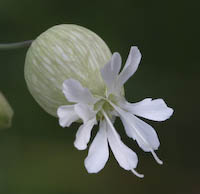Bladder Campion
Silene vulgaris
(formerly Silene cucubalus) |
 Other common names:
Catchfly Other common names:
Catchfly

Other scientific names:
Silene cucubalus, Behen vulgaris, Cucubalus latifolius, Silene latifolia

French names:
Silène enflé

Family:
Pink Family (Caryophyllaceae)

Group:
Campions

Distinctive features:
Bladder-like flowers with white petals.

Similar species:
•
White Campion (Silene latifolia) - Stems fuzzy, flowers larger, petals bigger.
•
Night-flowering Catchfly (Silene noctiflora) - Stems fuzzy, flowers larger, petals bigger. Plant sticky.
•
Red Campion (Lychnis dioica) - Stems fuzzy, flowers larger, petals bigger and red/pink.

Flowers:
Summer; White; 5 parts (petals)

Leaves:
Opposite/Whorled, Entire

Habitat:
Fields and Open Areas

Books:
Newcomb's Wildflower Guide: 260

Native/Non-native:
Non-native

Origin and Meaning of Names:
Scientific Name: vulgaris: common (Latin)

Photographs:
44 photographs available, of which 8 are featured on this page. SCROLL DOWN FOR PHOTOGRAPHS.

Range Map is at the bottom of the page
 |
|
|
|
|
|
|
|
|
|
 |